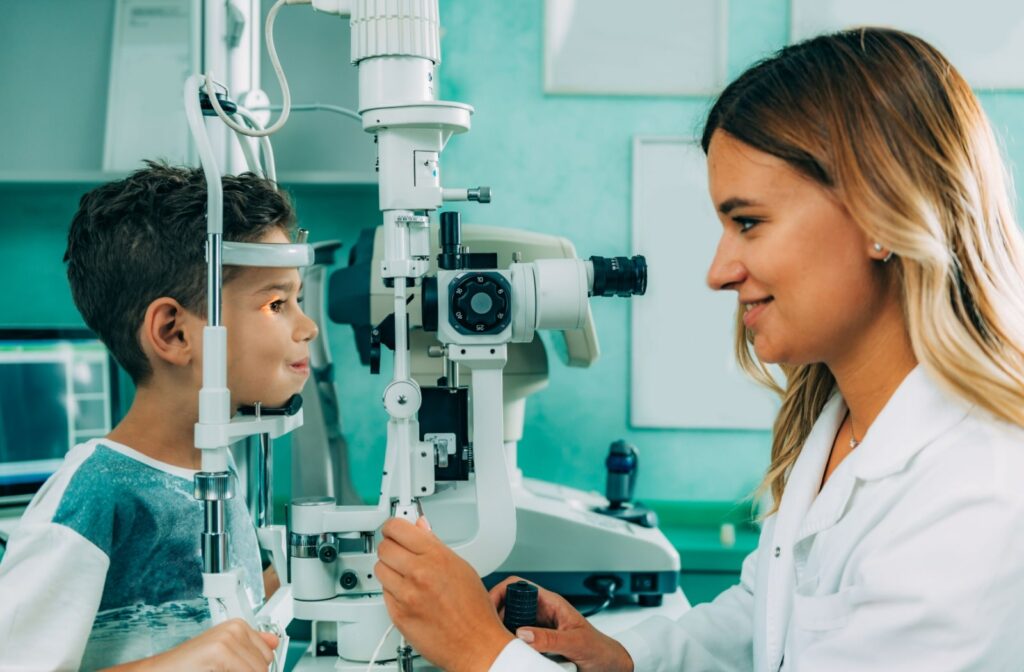Making sure that your child’s health extends to every aspect, including their eyesight, is a top priority for parents. The inaugural eye exam marks an essential step in their comprehensive health and development.
It’s advised by eye care professionals that children undergo their first eye assessment between six months to one year of age, even in the absence of visible vision issues. Adopting a preventive approach is important in managing ocular health and can help circumvent potential eye diseases and emergencies through routine exams and a wholesome lifestyle.
At Total Focus Optometry, our dedicated teams devote time to understanding you and your visual needs thoroughly. We will make sure that all your inquiries are addressed, offering comprehensive insights because we value your trust in our care as much as you value your eyesight.
Early Eye Exams for Kids
Vision is a pivotal component of a child’s development. The Canadian Association of Optometrists reveals that 1 in 7 Canadians suffers from visual impairments, with 1 in 4 school-aged children having undetected vision problems. Surprisingly, 61% of parents believe they would notice if their child had a vision issue, which has proven not to be the case.
Given that a significant portion of learning is visual, maintaining optimal eye health is essential for educational achievement. Identifying and addressing eye conditions early on, such as amblyopia (lazy eye) or strabismus (crossed eyes), can prevent or mitigate long-term visual impairment.
Regular eye exams for your child are not merely about making sure of clear vision; they’re fundamental to offering them the best start in life.
Infant Vision & Eye Exams
The primary aim of conducting eye exams on newborns and toddlers is to identify any potential issues early on that could lead to significant visual impairment or irreversible damage in the future.
From birth, babies rely heavily on their vision to discover and interact with the world around them. Initially, their focus is limited to objects within a 10-inch range. However, their visual capabilities swiftly evolve; by one month, they can see up to three feet away, becoming fascinated with human faces and contrasting patterns. By the second month, infants begin to coordinate their eyes to track motion and recognize familiar people. By the third month, they can differentiate between expressions like smiles and frowns and have improved depth perception.
Four-month-old babies start noticing vibrant colours and various textures, and by five to seven months, they have significantly better depth perception, can distinguish real faces from images, and follow moving objects more accurately. By eight months, a baby’s vision nearly matches that of an adult, enabling them to observe distant objects, notice small items up close, and understand facial expressions effectively.
Children & Eye Exams
The frequency of eye exams for children can differ based on individual requirements, including prescription updates or treating specific eye conditions. The Alberta Association of Optometrists generally advises the following schedule:
- The initial eye exam should take place between 6–9 months.
- At least one exam is recommended between 2–5 years.
- Annual eye exams are advocated after starting kindergarten.
It’s beneficial to know that in Alberta, health services cover the cost of annual eye exams for children up until 19 years of age, facilitating regular exams throughout childhood and adolescence without imposing a financial burden.
Should your child have a family history of eye conditions, require corrective lenses, or suffer from an eye injury or infection, more frequent consultations may be advised.
Expectations for the Initial Eye Exam
The inaugural eye exam for children is designed to be simple and varies with the age of the child. In the case of infants, the optometrist assesses the development of the eyes and vision by observing the baby’s response to different stimuli. For older children, the examination includes vision screening, tests of eye muscle functionality, and a comprehensive review of eye health. All these methods are non-invasive and should not result in any discomfort.
Guidelines for Getting Your Child Ready for an Eye Exam
Reducing your child’s apprehension about eye exams can be achieved by discussing the process in a way that’s easy for them to understand. Consider describing that the eye doctor will examine their eyes to enhance their vision and make sure that their eyes are feeling well. It’s also a good idea to arrange the exam with the eye doctor at a time after your child’s nap or when they’re usually more at ease to make the experience as smooth as possible.
Support Your Child’s Vision
By focusing on your child’s visual health and organizing an eye exam between 6 months and 1 year of age, you’re contributing to their overall well-being and laying the foundation for their success in the future.
Untreated vision issues can escalate into serious problems, making regular eye exams crucial for all children. At Total Focus Optometry, cultivating awareness about eye health in both children and adults is more than just a duty—it’s our passion. We are committed to assisting your family in developing positive habits for excellent eye health. Book your child’s next eye exam with us today!



